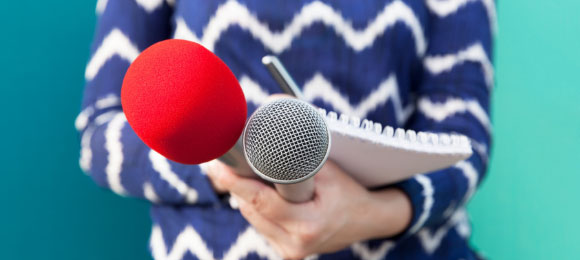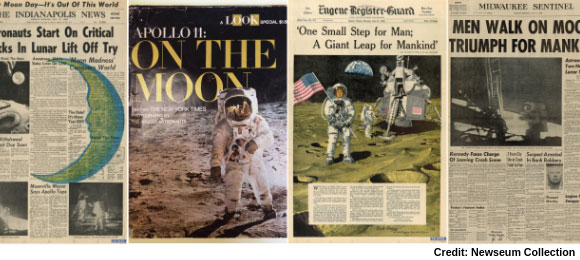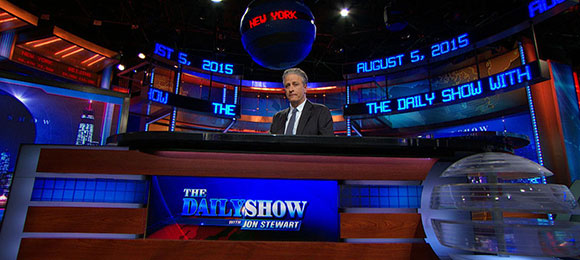June 2019 E-Newsletter
This month get our take on what can be done to counter the public's mistrust of the news media, Apollo 11 moon landing anniversary resources, a new exhibit on Jon Stewart, and more!
Not on our mailing list? Subscribe
Field Trips Classes Learning Tools News EDCollections

Today's Challenges & Opportunities: RESTORING TRUST IN JOURNALISM
A new Pew Research Center report finds that about a third of U.S. adults — and nearly six-in-10 Republicans and Republican-leaning independents — believe that journalists “create a lot of made-up news and information.” It also shows that 37 percent of U.S. adults see “journalists inserting their own views” into coverage as a “very big problem” in keeping the public informed. This report is the latest among many surveys in recent years that paint a very troubling picture: the news media has a problem with public trust.
A Sampling of Press Coverage
- Americans think “made-up news” is a bigger problem than climate change, Nieman Lab
- Republicans are Three Times More Likely Than Democrats to Blame Journalists for Fake News: Survey, Newsweek
- Some Real News About Fake News, The Atlantic
- Pew Research Center finds widespread agreement about the 'made-up news' malady, CNN
Our Take
When it comes to restoring trust in journalism, news producers and news consumers both have a role to play. Media outlets should strive toward greater transparency in their sourcing, clearly distinguish news coverage from opinion, diversify their hiring, and take more care to avoid the sloppy journalism that leads to inaccuracies and mistrust. In the Pew Research survey, adults regardless of political leanings don't consider the news media the top creator of made-up news (that blame goes to politicians), but they do say the media bears “the most responsibility in reducing the amount of made-up news and information,” more so than the public, the government or tech companies. Survey respondents say the responsibility rests next with the public. As such, the public should not be exempt from being part of the solution.
Education needs to play a greater role in rebuilding public trust in the media by making it easier for people of all ages to analyze content and understand the decisions and processes that shape news coverage. NewseumED’s Explore the Information Universe lesson plan and its Separating Facts and Opinions collection of resources were created to help students and adults alike sharpen their ability to differentiate types of media. At the same time, the Is It Fair? lesson plan provides guidelines for identifying true bias and not just opinions people may disagree with.
Our virtual Choose the News class demystifies the decision-making process of what makes something newsworthy for print, online, radio or television. And we have several resources to help address the public’s confusion over anonymous sources: the Anonymous Sources in Our Daily News lesson plan, Sources video, and Ask an Expert: Anonymous Sources video.
-----------------------------------------
NewseumED Resources and Connections
Major Milestones
Fifty years ago, two American astronauts took “one giant leap for mankind” when they stepped onto the moon’s surface on July 20. Explore how various publications covered this historic Apollo 11 mission. Then pair the landing with another grand engineering achievement 100 years earlier — the completion of the first Transcontinental Railroad in 1869. What do you or your students think will be the greatest engineering feat of the 21st century?
Teacher Open House
Circle Saturday, Oct. 5, on your calendar to attend our annual Teacher Open House at the Newseum. Over the past decade, thousands of educators have come to sample our classes, discover our free and ever expanding digital resources, mingle with peers and attend special programs and tours. This year, learn about our virtual class offerings. Watch for more information as the date gets closer.
-----------------------------------------
NewseumED in the Community
NewseumED staff are presenting and exhibiting at a number of upcoming conferences. If you’re attending any of the following events, be sure to say “hello” and pick up some of our free resources.
- June 21-24, American Library Association (ALA), Washington, D.C. Booth 2343. Presenting on designing community programs, 1 p.m. June 22.
- June 23-26, International Society for Technology in Education (ISTE), Philadelphia. Booth 217. Presenting on “Techniques and Tips for Teaching Media Literacy,” 1:30 p.m. June 24.
- June 26-28, National Association for Media Literacy Education (NAMLE), Washington, D.C. Holding a workshop on teaching media literacy skills on June 26 at the Newseum, and moderating the plenary session on June 28 when all conference events will take place at the Newseum. Register here.
- July 11-13, AFT TEACH (Together Educating America’s Children), Washington, D.C. Part of a panel on how to teach people to spot fake news, 1:15 p.m. July 12.
-----------------------------------------
Newseum Happenings
Newest Exhibit
“Seriously Funny: From the Desk of ‘The Daily Show with Jon Stewart',” which explores the impact Stewart’s program had on American politics and the press, opens June 21 at the Newseum. The centerpiece of the exhibit is Stewart’s desk from the Comedy Central show donated to the Newseum after Stewart’s final appearance on the late-night series after 16 years hosting the popular program. The exhibit runs through Dec. 31, 2019.
Newseum Summer Deal
Don’t miss the Newseum’s Summer Fun Deal! From July 1 through Labor Day, up to four youth (ages 7-18) get in free with each paid adult or senior admission. Tickets can be purchased in advance online. Get more information and tickets here.
-----------------------------------------
On Hiatus: The NewseumED newsletter will be taking July off. It’ll return in August to help educators gear up for the new school year. Enjoy your summer!


